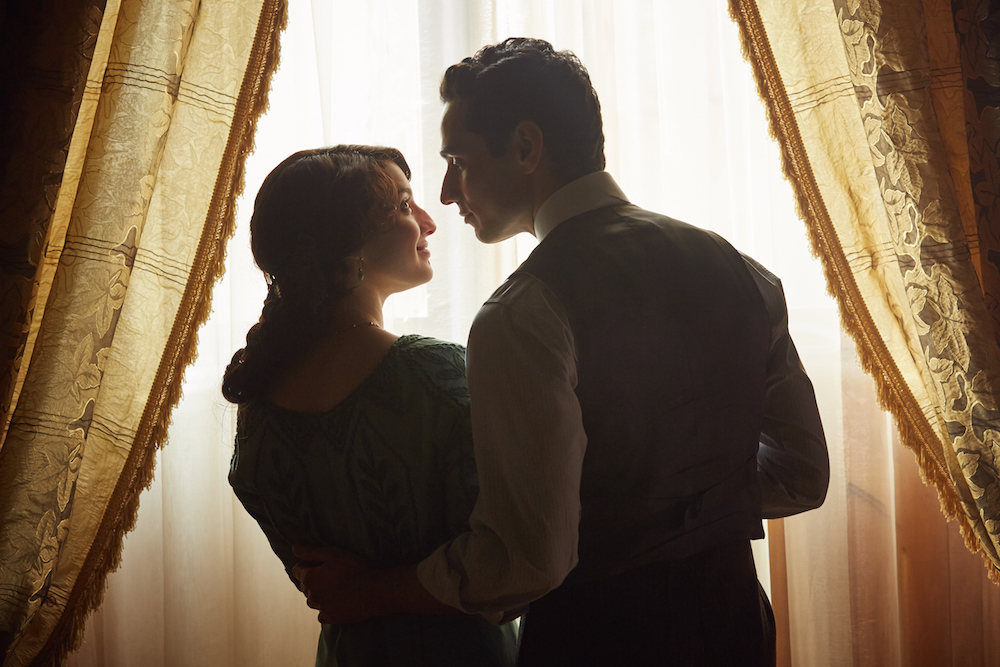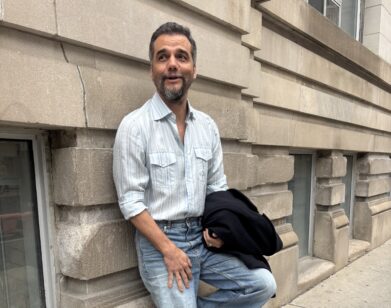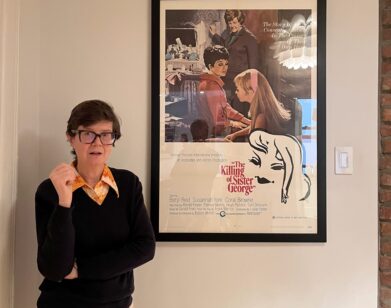Love and War
Up in the mountains above the village of Gadabay in the lower Caucasus, on a hilltop surrounded by a verdant expanse of green and clear, open sky, Asif Kapadia trained his camera on a narrow stone bridge. Kapadia—the director of the Oscar-winning Senna and last year’s much-lauded Amy Winehouse documentary Amy—was at work, almost 3,000 miles from his London home, on his latest film Ali and Nino, an adaptation of the classic 1937 Azerbaijani novel written by Kurban Said. Here, in the western region of Azerbaijan, not too far from the Georgian border, the lush landscape served as sumptuous set dressing for a key scene the saga (and no, we won’t spoil it).
For a few days in April last year, Interview decamped to Kapadia’s set for a behind the scenes look at the production in progress, just before the crew relocated to Turkey to shoot a series of interior scenes in Istanbul. In his fictional features, including past films Far North and The Warrior, Kapadia has a taste for epics in far-flung locales. Fittingly, the source material easily translated into a dramatic period piece: Said’s novel takes its context from the crossroads the Eurasian country faced in the years before the Bolshevik revolution and World War I, when an oil boom sparked a rush of nascent globalization (one in which the Nobel brothers and the Rothschilds earned their early fortunes) and the nation was on the brink of announcing itself as a democratic republic. But the heart of the story is a romance: Ali, a Muslim Azerbaijani boy and Nino, an aristocratic Georgian Christian girl, defy their cultural backgrounds and obstacles of distance, war, and family in order to be together, before an inevitable tragic end.
“One of the reasons to go to the cinema is to have a communal, emotional experience,” producer Kris Thykier explains. “I thought there was room in the market for something that was unashamedly romantic.” The sweeping vistas, ornate costumes, and palatial interiors up the romance ante. Gökhan Tiryaki, who lensed Winter Sleep and Once Upon a Time in Anatolia, served as DP; Atonement and Anna Karenina composer Dario Marianelli crafted the score. Michele Clapton, the costume designer behind Game of Thrones and the new Netflix series The Crown, researched extensively for period-specific references. “It’s a very character-led type of costume,” Clapton details. “It must show the development of the person. When I first did my drawings I drew all this ethnic Azeri clothing. I started reading about it and I realized this huge influence of Russia and Paris. If you immerse yourself in the period, then you can actually start being quite playful with it, interpreting that imagery.” Kapadia casted two up-and-comers in the roles of the couple—Adam Bakri, who starred in Palestine’s 2013 Oscar contender Omar, as Ali, and Maria Valverde, who’s worked prolifically in Spain but has made the jump to Hollywood fare like Ridley Scott’s Exodus: Gods and Kings, as Nino. Mandy Patinkin, Connie Nielson, and Halit Ergenç round out the rest of the ensemble cast. “As an actress, I want to do films that I want to see as an audience,” Valverde says. “What attracted me to my character, Nino, is how powerful she was, and she is. She’s very modern for 1914. She’s the kind of woman that I really need to play as an actress.”
Though much of the action takes place in in the labyrinthine, cobblestoned Old City of Azerbaijan’s capital, Baku, Valverde and the rest of the cast and the largely British and Turkish crew crisscrossed the country, filming a snowy winter scene in the remote ancient mountaintop settlement of Khinalug, and heading west to a series of locations outside the city of Ganja. In an open valley, with mountains in the distance subbing in for the Iranian border, we watch Ergenç, playing Fatali Khan Khoyski, the first prime minister of an independent Azerbaijan, deliver the news of the country’s independence to Ali.
Locals were recruited to play extras, and a scrum of horses was enlisted for the war scenes. Horse wrangler Janbi Ceylan sourced them from the Azeri military as well as show horses and local horses. “The movie industry is not big in Azerbaijan, so they have no filming experience,” Ceylan explained of his charges. “Each horse has their own character, own attitude. So trying to understand each one’s character and find the approach that works was difficult.” Bakri, for his part, worked with a stunt double, but underwent horse training and studied Azeri dialects. When we meet for an interview at the Ramada Hotel in Ganja, on a rare day off for Bakri, he talks about getting into character: “He’s an adventure guy. He’s a desert boy. He loves hunting and catching snakes and climbing mountains. He loves the desert and the sand. He’s a tough guy, and he went to military school. But when it comes to Nino, that’s where we see his soft side.”
Before working with Kapadia, the actor studied up on his films. “His frames are amazing. The landscapes, they’re like paintings,” Bakri reflects. “He really likes the takes, and he is very specific about his frame and about what he sees. He really shares everything: the scene, the character, the arc of the scene. He makes sure that you know what he likes to see.” Bakri taps into the universal nature of the story, which Thykier compared to Romeo & Juliet and The Great Gatsby. “It’s something that’s similar to you, but at the same time, it’s an exotic place,” Bakri says. “It’s not another war film. It has more elements to it. It talks about differences, but at the same time, it talks about similarities. This movie, for me, for Asif, and for everyone, is a love story.”
ALI AND NINO IS OUT TODAY, NOVEMBER 18, 2016.







